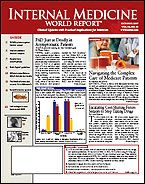Publication
Article
Internal Medicine World Report
Many People Forego Routine Hand-Washing
Author(s):
The Lighter Side of Medicine, with Serious Sequelae
The Lighter Side of Medicine, with Serious Sequelae
By Sarah Pressman Lovinger, MD
CHICAGO—Many Americans may be inadvertently spreading disease by not washing their hands in public restrooms, investigators reported at the Interscience Conference on Antimicrobial Agents and Chemotherapy.
Julie L. Gerberding, MD
An observational study sponsored by the American Society for Microbiology (ASM) and the Soap and Detergent Association (SDA) showed that only 77% of men and women washed their hands in public restrooms. Hand-washing practices were better in 2005, when 83% of surveyed individuals washed their hands.
This observational study included 6076 adults who were evaluated in 4 cities—Atlanta, Chicago, New York, and San Francisco—at 6 different locations, including sports stadiums, train stations, and an aquarium. All the restrooms were equipped with adequate sinks, soap, and towels. The same locations were used in the 2005 study. People who washed their hands with water only and did not use soap were considered to have not washed their hands.
Apparently, more Americans claim to wash their hands than actually do so. In a separate telephone survey, 92% of adults claimed they washed their hands.
"Hand-washing is the simplest, most effective thing people can do to reduce the spread of infectious diseases," said Julie L. Gerberding, MD, director of the Hospital Infections Program, Centers for Disease Control and Prevention.
Hand-washing habits differed by gender and region. The current survey found that 88% of women washed their hands compared with only 66% of men who bothered to perform this important function.
"Clearly, guys need to step up to the sink," said Brian Sansoni, spokesperson for the SDA. "Women are much better."
Chicagoans were most likely to wash their hands (81%), followed by New Yorkers (79%). Fewer adults using public restrooms in Atlanta (75%) and San Francisco (73%) lathered up. Only 57% of men washed their hands at Turner Field in Atlanta, the lowest rate at all locations surveyed. However, almost all women (95%) using restrooms at this location were seen washing their hands.
Hand-washing was inversely related to income. People in blue-collar jobs were more likely to wash their hands than those in managerial positions.
The telephone survey also showed that only one third of adults admitted washing their hands after sneezing or coughing; 86% of women, compared with 70% of men, say they wash their hands after handling a diaper.
Although experts recommend hand-washing, the study did not determine the outcomes of washing or not washing hands in community settings. The importance of hand-washing in hospitals is well-known.
Infectious disease experts asked physicians to remind their patients to wash their hands in the restroom, as well as after such potentially disease-spreading activities as changing a diaper or touching a pet.
"The more people do their part to control the spread of infections, the less we have to use antibiotics, which lose their potency over time, as bacteria develop resistance to them," said Judy Daly, PhD, secretary of the ASM.
It was noted that hand-washing increases during well-publicized disease outbreaks, such as the severe acute respiratory syndrome (SARS) outbreak in 2002.
P
Other investigators reported results from studies that evaluated the use of alcohol-based hand rubs in healthcare settings, with one study of Italian healthcare workers showing low rates of hand-washing. Susanna Esposito, MD, and colleagues at the University of Milan surveyed 2405 healthcare workers at a large teaching hospital in that Italian city. Only 29.8% of those surveyed admitted complying with hand-washing guidelines; rates among physicians were significantly lower ( <.001). Most respondents (76.7%) indicated that the availability of alcohol-based hand rubs would be the best way to improve compliance.






